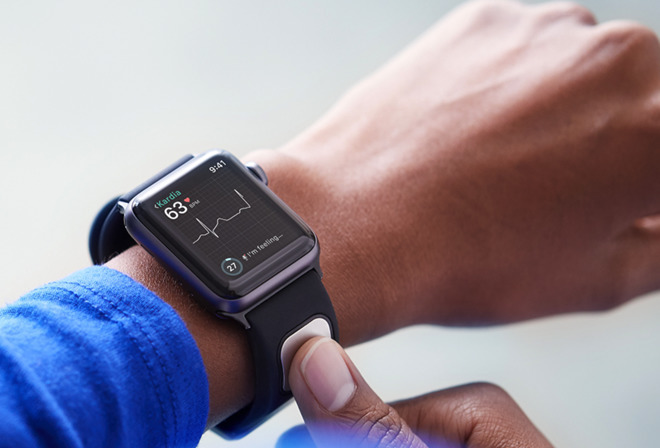A pair of studies shared by AliveCor — which makes the KardiaBand EKG band for the Apple Watch — suggest that the accessory may be effective at detecting at least two serious health conditions.
A study conducted in tandem with the Cleveland Clinic found that the KardiaBand was able to detect atrial fibrillation with 93 percent sensitivity and 94 percent specificity, roughly equivalent to what a physician could do looking at the same EKG data. With a physician actually examining the data, sensitivity reached 99 percent.
The second study, done with the Mayo Clinic, simply hinted that combining an AliveCor EKG device with AI technology was an effective means of discovering high potassium levels, known as hyperkalemia. It can potentially be a sign of greater problems like diabetes and heart failure.
Sensitivity ranged between 91 and 94 percent. Tests did not use the KardiaBand, but conceivably could be applied to the Apple Watch accessory.
The KardiaBand is not a cheap add-on, costing $199 upfront plus an additional $99 per year for a subscription service.
Apple has been rumored as working on its own built-in EKG technology for the Watch, but there's no indication of when — or even if — that will make it into a shipping product.
 Roger Fingas
Roger Fingas








 Malcolm Owen
Malcolm Owen
 Amber Neely
Amber Neely


 Christine McKee
Christine McKee

 Chip Loder
Chip Loder
 Marko Zivkovic
Marko Zivkovic









6 Comments
I thought the kardia band was promising, but it requires that you disable activity tracking on the watch while it’s working. If you want to do advanced tracking all day long, that means disabling activity tracking on your watch all the time. I’m hoping they or Apple will come out with something less restrictive.
I can absolutely see Apple going to (single lead) EKG...
Even without the additional ability to screen for heart rhythm abnormalities, for simply measuring heart rate it is far more accurate while significantly lowering battery drain.
Chest strap monitors make a good example: When I was using it daily my Polar H7 needed a battery change about once a year. Yet, the Cleveland Clinic rated it 99% accurate while the Apple Watch (while being the most accurate wrist based monitor they tested) only yielded a 90% accuracy....
If/when they move that technology to the wrist it will be a game changer:
-- increased battery life
-- increased heart rate accuracy
-- expanded functionality